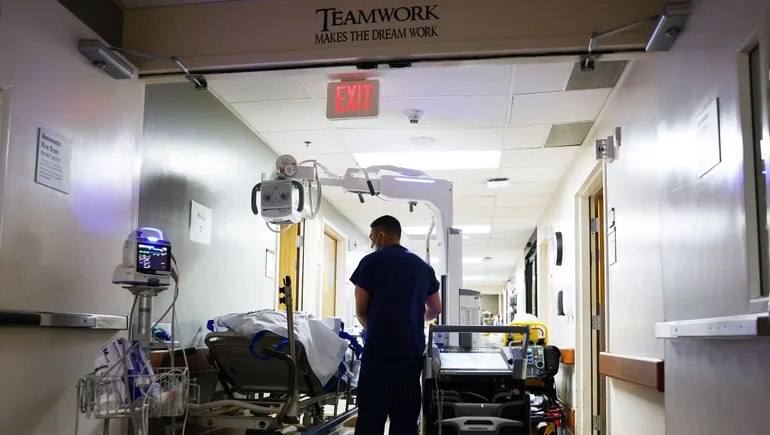Dive Brief:
More than one million jobs — including hundreds of thousands of positions in the healthcare sector — could be lost if cuts to Medicaid and food assistance pass in Congress, according to a report published this week by the Commonwealth Fund and the George Washington University Milken Institute School of Public Health.
Across the country, 1.2 million jobs could be lost in 2029 as funding reductions to the safety-net insurance and the Supplemental Nutrition Assistance Program, or SNAP, ripple through states. The impact would be comparable to increasing the nation’s unemployment rate by one-sixth, the healthcare researchers said.
The healthcare industry would be particularly hard hit. Nearly 500,000 jobs would be cut in the sector, like roles at hospitals, physician offices, pharmacies and long-term care providers.
Dive Insight:
The One Big Beautiful Bill Act, which includes a number of healthcare provisions including significant cuts to Medicaid, narrowly passed in the House late last month.
Notably, the legislation would mandate work requirements for Medicaid, requiring beneficiaries to log work, volunteer or education hours to stay enrolled in coverage. Last week, Republicans in the Senate released their proposal, which includes steeper cuts to Medicaid through expanded work requirements and more restrictions on state provider taxes.
The cuts to federal funding would likely damage state economies, lowering revenue for providers and then impacting other businesses in their supply chains — as well as the jobs and incomes of their workers, according to the report.
Cuts to Medicaid and SNAP would lower states’ gross domestic products by $154 billion in 2029, 18% higher than the savings the bill would provide to the federal government.
Additionally, the income lost by businesses and state residents would slash state and local revenues by $12.2 billion that year. Since states are required to balance their budgets, they would need to raise taxes or cut spending elsewhere to make up for the losses, according to researchers.
“Medicaid and SNAP aren’t just safety-net programs — they’re economic engines,” said Leighton Ku, lead author of the analysis and director of the Center for Health Policy Research at the George Washington University Milken Institute School of Public Health. “Cuts of this magnitude would harm millions of families and destabilize state economies, triggering a devastating number of job losses and fiscal strain.”
The impact from the cuts vary by state. Those with more low-income families that depend on programs like Medicaid and SNAP would be harder hit by job losses.
For example, the average job loss in the five states with the highest poverty rates — Louisiana, Mississippi, New Mexico, West Virginia and Kentucky — is 1.3 percentage points, compared with 0.6 percentage points for the states with the lowest poverty rates, which include New Hampshire, Utah, Minnesota, Colorado and Maryland.
The severity of Medicaid cuts would also depend on states. Overall, more than 13% of federal Medicaid funds would be lost nationwide in 2029. Arizona would lose more than 21%, while Wyoming would see its funds decline by nearly 6%.


